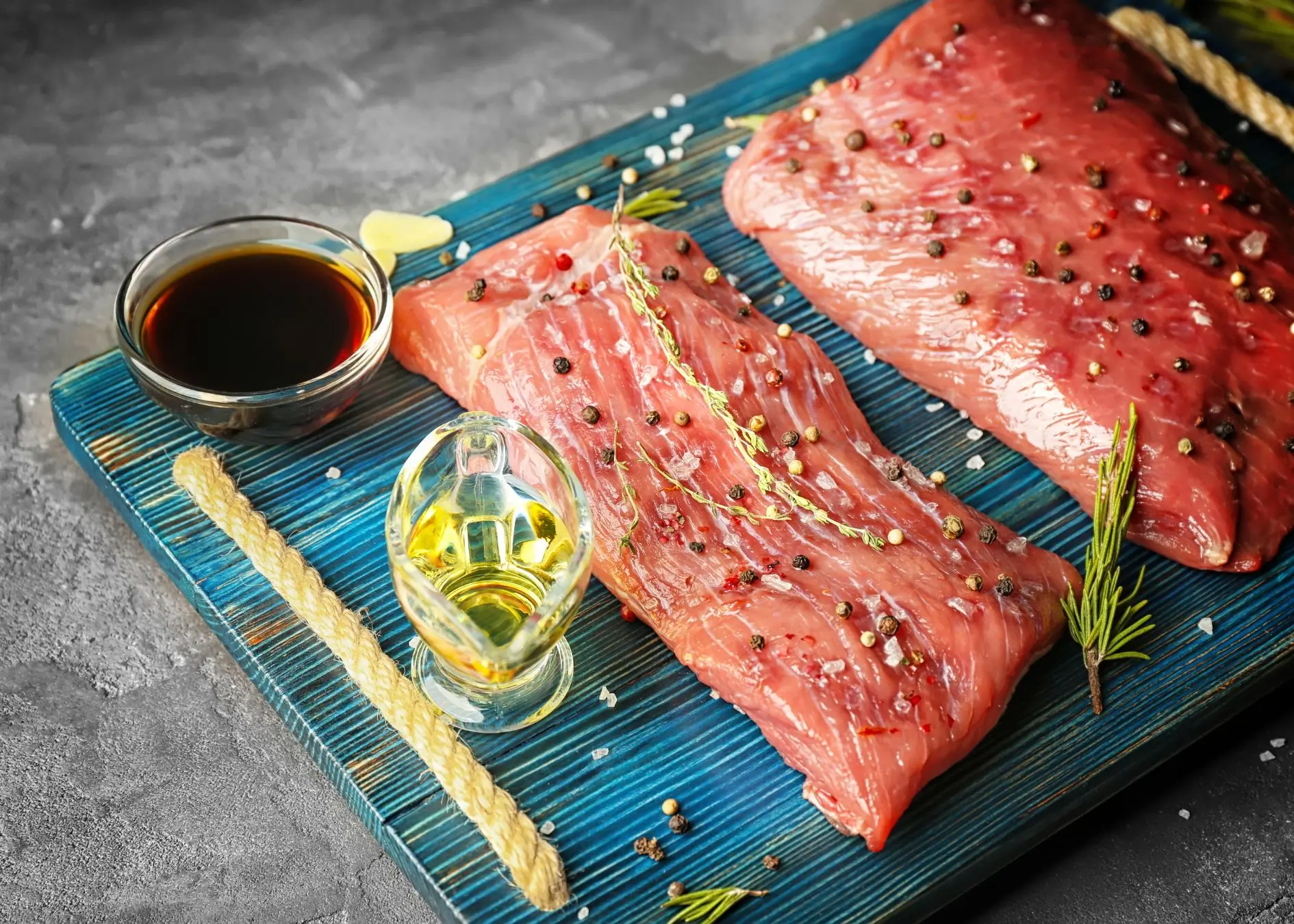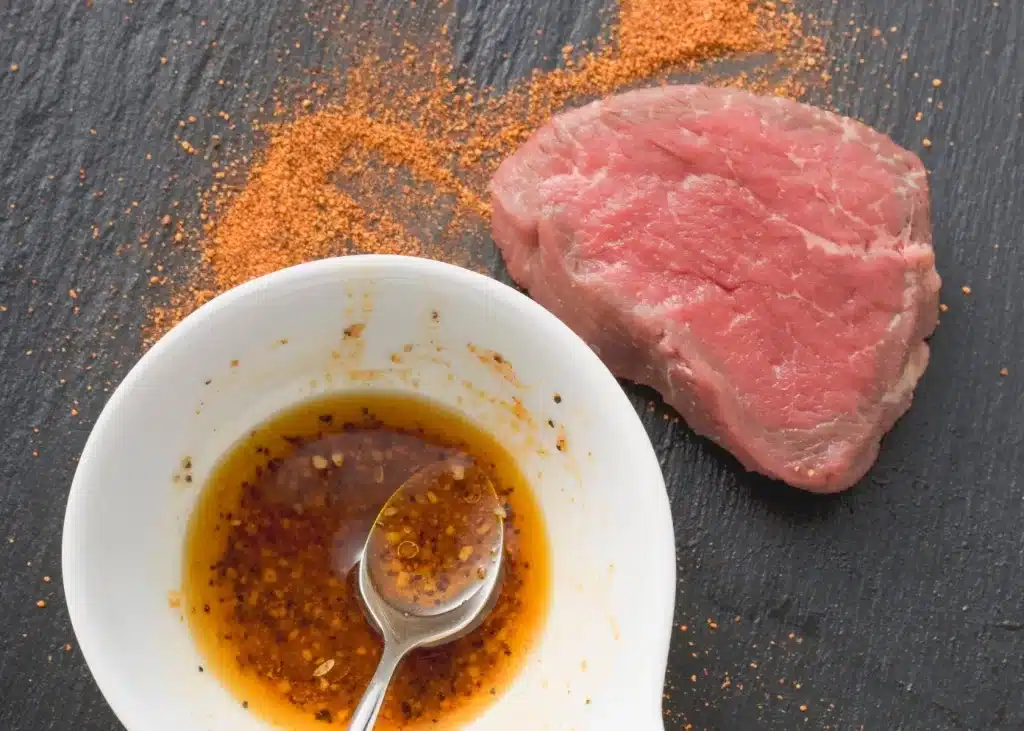A marinade is a liquid mixture that soaks meat, fish, or vegetables and adds flavor before cooking. Homemade marinade for steak gives the food a different taste and makes the proteins softer.
In terms of steak, it improves its taste and simplifies the process of breaking down some hard muscle fibers, thus making it tender and juicy.
Why marinading is so beneficial?
First, the flavor cannot be attained by just seasoning alone. The marinade penetrates the meat to ensure the flavors reach each mouthful. Besides this, acidulated ingredients on marinades make toughened meat more chewable.
An acidic ingredient, oil or fat, herbs and spices, and sometimes a tenderizing agent (steak marinade for tenderizing) are an excellent marinade’s four most important constituents. Each ingredient contributes towards producing a rich combination of tastes as well as feels. In the later sections, we will talk about how to marinate a steak.
Ingredients for the Best Steak Marinade Recipe
Looking for some of the ingredients to make a good marinade for steak? Here’s how to do it.
Acidic Ingredients
Acidic ingredients, such as vinegar (e.g., balsamic, red wine, apple cider), citrus juices (lemon, lime, orange), or wine, are essential components of a good steak marinade. These acidic elements help break down the meat’s tough proteins, resulting in a more tender and juicy steak. However, striking a balance is important, as excessive acidity can make the meat mushy or overly sour.
Oil and Fats
Oils and fats play a crucial role in marinades, providing flavor and preventing the meat from drying out during the cooking process. Common choices include olive oil, avocado oil, sesame oil, or even melted butter. These oils can also carry fat-soluble flavors, allowing them to penetrate deeper into the meat.
Herbs and Spices
Herbs and spices are the flavor powerhouses of any marinade. These ingredients add depth and complexity to the marinade, from fresh herbs like rosemary, thyme, and parsley to bold spices like garlic, paprika, and chili powder. They can be used whole, chopped, or in powdered form, depending on the desired texture and intensity of flavor.
Sweeteners and Aromatics
A sweet touch can balance the acidity and create a harmonious blend of flavors in a steak marinade. Common sweeteners include honey, brown sugar, maple syrup, and fruit juices. Aromatics like onions, shallots, or garlic can also add a depth of flavor and aroma to the marinade.
Tenderizing Agents
While not always necessary, some marinades incorporate tenderizing agents further to break down the tough proteins in the meat. Popular choices include pineapple juice containing the enzyme bromelain or powder tenderizers like papain or meat tenderizer. However, using these agents judiciously is important, as overuse can result in a mushy texture.
Essential Marinating Techniques
Preparing the Steak
Before marinating steak, it’s essential to prepare the steak properly. Start patting the meat dry with paper towels to remove any excess moisture. This step ensures that the marinade can adhere to the steak effectively. If the steak is too thick, consider scoring or piercing the surface with a fork to allow the meat marinade to penetrate deeper into the meat.
How long to marinate steak
The marinating time and temperature can significantly impact the flavor and texture of the steak. Generally, marinating for at least 30 minutes to a few hours is recommended for optimal flavor absorption. However, marinating for up to 24 hours can help tenderize the proteins for tougher cuts of meat.
It’s important to note that marinating for too long can result in an overly mushy or acidic texture, so finding the right balance is essential. As a general rule, marinate steaks at refrigerator temperature to prevent the growth of harmful bacteria.
Marinating Different Cuts of Steak
Not all cuts of steak are created equal, and some may require different marinating times or techniques. Tender cuts like filet mignon or ribeye may only need a few hours of marinating, while tougher cuts like flank steak or skirt steak can benefit from a longer marinating time to help break down the tough fibers.
Additionally, consider the size and thickness of the steak when marinating. Thinner cuts may only need a couple of hours, while thicker steaks may require up to 24 hours for the marinade to penetrate the meat fully.
Classic Steak Marinade Recipes
Here are some of the best marinade for steak options for you!
Balsamic Marinade
This rich and tangy marinade combines the bold flavors of balsamic vinegar, Dijon mustard, and aromatic herbs like rosemary and thyme. The sweetness of the balsamic vinegar is balanced by the acidity, creating a depth of flavor that pairs beautifully with any cut of steak.
Teriyaki Marinade
Originating from Japanese cuisine, a teriyaki marinade is a crowd-pleaser. This marinade typically consists of soy sauce, rice vinegar, brown sugar, ginger, and garlic. The combination of salty, sweet, and umami flavors creates a caramelized glaze on the steak, resulting in a delightful taste and texture.
Garlic and Herb Marinade
For those who love the classic flavors of garlic and herbs, this marinade is a must-try. Fresh garlic, rosemary, thyme, and parsley are combined with olive oil, lemon juice, and a touch of Dijon mustard. This marinade not only infuses the steak with an herbaceous aroma but also helps tenderize the meat.
Chimichurri Marinade
Hailing from Argentina, a chimichurri marinade is a vibrant blend of fresh parsley, oregano, garlic, red wine vinegar, and olive oil. This steak marinade for grilling imparts a bright, fresh flavor to the steak, making it a perfect choice for grilling or pan-searing.
Specialty Homemade Steak Marinade
Filet Mignon Marinade
Filet mignon, a tender and luxurious cut of beef, deserves a beef marinade that complements its delicate flavor. A combination of red wine, Dijon mustard, garlic, and fresh herbs like rosemary and thyme creates a sophisticated marinade that enhances the natural flavors of the filet without overpowering it.
Sirloin Steak Marinade
Sirloin steak, a flavorful and moderately tender cut, benefits from a marinade that adds depth and helps to tenderize the meat. A marinade featuring balsamic vinegar, Worcestershire sauce, garlic, and a touch of brown sugar creates a rich and tangy flavor that pairs perfectly with the bold taste of sirloin.
Soy Sauce Steak Marinade
A soy sauce-based marinade is a classic choice for infusing steaks with an umami-rich flavor. Combine soy sauce with rice vinegar, brown sugar, ginger, and garlic for a marinade that not only adds a savory depth but also helps to tenderize the meat.
Tenderizing Marinade
A tenderizing marinade can work wonders for tougher cuts of steak, like flank or skirt steak. This marinade typically includes ingredients like pineapple juice containing the enzyme bromelain or powder tenderizers like papain. When combined with acidic components like vinegar or citrus juices, this marinade can help to break down the tough muscle fibers, resulting in a more tender and enjoyable steak.
Quick and Easy Marinade For Steak
Not every occasion calls for an elaborate marinade. Sometimes, you need a quick and easy steak marinade that still delivers delicious results. Here are a few simple yet flavorful marinades that can be whipped up in no time.
Lemon and Garlic Marinade
This zesty quick steak marinade combines the brightness of lemon juice with the pungent aroma of garlic. Simply whisk together lemon juice, olive oil, minced garlic, salt, and pepper for a refreshing and tangy marinade that pairs well with any cut of steak.
Dijon and Herb Marinade
For a robust and herbaceous flavor, try a Dijon and herb marinade. Mix Dijon mustard with olive oil, red wine vinegar, and your choice of fresh herbs like parsley, rosemary, or thyme. This marinade adds a delightful depth of flavor with minimal effort.
Honey and Soy Marinade
If you’re craving a sweet and savory combination, a honey and soy marinade is the way to go. Combine soy sauce, honey, garlic, and a touch of rice vinegar for a marinade that creates a beautiful caramelized glaze on the steak during cooking.
Marinating for Different Cooking Methods
While marinades can enhance the flavor of any steak, certain marinades are better suited for specific cooking methods. Here are a few recommendations:
Grilled Steak Marinade
For grilled steaks, opt for marinades that can withstand high heat and create a beautiful char. Marinades with ingredients like balsamic vinegar, Worcestershire sauce, or soy sauce work well, as they help to create a caramelized crust on the steak.
Pan-Seared Steak Marinade
When pan-searing steaks, look for marinades that won’t burn or overpower the delicate flavors of the meat. A simple marinade with olive oil, garlic, herbs, and lemon juice can add a subtle yet delicious flavor without overwhelming the steak.
Oven-Roasted Steak Marinade
For oven-roasted steaks, consider marinades that can withstand longer cooking times without drying out the meat. Marinades with a higher oil content, such as those with olive oil or avocado oil, can help to keep the steak moist and flavorful during the roasting process.
Tips and Tricks for Perfect Marinated Steaks
Choosing the Right Cut of Steak
The cut of steak you choose can significantly impact the marinating process and the overall texture of the finished dish. Tender cuts like filet mignon marinate or ribeye may only require a short marinating time, while tougher cuts like flank or skirt steak benefit from longer marinating periods to help tenderize the meat.
Marinating Time and Temperature Guidelines
As mentioned earlier, marinating time and temperature are crucial in achieving the perfect texture and flavor. Generally, marinate steaks in the refrigerator for at least 30 minutes to a few hours for tender cuts, and up to 24 hours for tougher cuts. Avoid marinating at room temperature, as this can promote bacterial growth.
Techniques for Even Marinating
To ensure even marinating, consider using a resealable plastic bag or a non-reactive container. If using a container, be sure to flip or turn the steak occasionally to ensure all sides are exposed to the marinade. You can also score or pierce the surface of the steak to allow the marinade to penetrate deeper into the meat.
Reusing Marinade: Safety Considerations
While it may be tempting to reuse the marinade as a sauce or baste, it’s important to exercise caution. Raw marinades that have been in contact with uncooked meat may contain harmful bacteria. If you plan to reuse the marinade, be sure to bring it to a full boil before using it as a sauce or baste to kill any potential bacteria.
Conclusion
Crafting homemade marinades for steak is an art form that combines flavors, techniques, and culinary creativity. You can elevate your steak game by mastering the basics of marinade ingredients, marinating techniques, and tailoring marinades to specific cuts and cooking methods.
Remember, the key to a successful marinade lies in finding the perfect balance of acidity, sweetness, and robust flavors. Experiment with different combinations, trust your palate, and enjoy the journey of creating delectable marinated steaks that will have your taste buds dancing with delight.
Whether you’re a seasoned grill master or a home cook seeking to impress, the art of homemade marinade for steak will open up a world of flavor possibilities, transforming ordinary steaks into extraordinary culinary experiences. So, roll up your sleeves, gather your ingredients, and let the marinating adventure begin!


